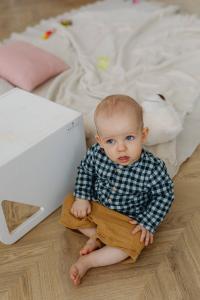Your Toddler Throws Toys Instead of Playing? Here's Why
Your Toddler Throws Toys Instead of Playing? Here's Why
Your child throws toys instead of playing? Many parents of young toddlers are concerned when they see their child throwing toys rather than playing.
While this throwing behavior may be frustrating, the good news is that it is actually a pretty common toddler behavior.
As toddlers learn to control their bodies and understand the consequences of their actions, they will eventually outgrow this phase.

Table of Contents
Here’s Why Your Toddler Throws Toys Instead of Playing
When a toddler throws toys rather than playing, it could be frustrating for parents. But there are some good reasons why this might happen.
- Many experts believe that throwing is an important part of a child’s development. Through throwing, children reach a developmental milestone in which they acquire new skills, learn about cause and effect, develop gross and fine motor skills, and build considerable hand-eye coordination.
- Another reason is that the toddler might be overwhelmed or overstimulated. In this case, throwing the toy can sometimes be their best way to deal with the overload of sensory information.
- Another possibility is that the toddler is bored or doesn’t know what to do with the toy. In case of lack of interest, throwing toys can be the right way (in their eyes) to get attention from parents or siblings, encouraging them to teach them how to teach them play with the toys or suggesting them other fun games.
- In some cases, toddlers throw their toys to create social interactions – they throw the toy, and they expect the adult to pick it up. While discovering this joyful game, they can also find their power in influencing people’s reactions and developing their social skills using nonverbal communication.
- It is important to remember that it is developmentally normal for toddlers to engage in this type of behavior. In fact, throwing is one of the ways that toddlers learn about cause and effect and observe the logical consequences of throwing an object.
- They also learn about the properties of objects, such as how hard they can throw a toy without breaking it.
- When they sit on a high chair, they can also learn that they can make something disappear like magic!
- In other cases, toddlers throw things when they are angry or frustrated.
How To Address The Issue?
Parents can provide their toddlers with age-appropriate toys designed for this specific type of play and let them practice the appropriate behavior in actual throwing games: foam ball to throw through a basketball hoop, bean bags toss, ring toss, etc.
They can also teach their toddler how to throw objects safely by demonstrating how to throw.
In any case, it is vital to provide calm guidance and positive reinforcement and avoid getting upset at them. Try not to address it as part of what we call “inappropriate behaviors.”
Do not get into power struggles with them, and do not use a tone of voice that will make them feel ashamed of their allegedly bad behavior, as it might cause them to have low self-esteem in the long run.
With time and patience, toddlers will learn to control their emotions and use their toys in an intended way.
What Throwing Things Can Teach Children?
Children learn best through play, and there is no greater play activity than throwing. For instance, when a toddler throws a tantrum, they learn how to assert themselves and control their emotions.
They are also learning to communicate their desires and needs effectively. While it may be frustrating for parents to deal with temper tantrums, it is important to remember that these episodes are crucial for a child’s development.
Through tantrums, children learn how to manage their feelings and how to cope with frustration. As they grow older, they will be able to apply these skills to other areas of their lives.
So next time your toddler has a temper tantrum, take a deep breath and remind yourself that this is just another opportunity for them to learn and grow.
When To Be Concerned About A Toddler's Behavior With Toys?
It’s not unusual for toddlers to have a favorite toy. In fact, it’s common for them to want to play with the same toy over and over again. However, there are some things to be aware of in terms of your toddler’s behavior with toys.
If your toddler becomes fixated on a particular toy to the point where they refuse to play with anything else, this could be a sign of obsessive-compulsive disorder or one of the many developmental disorders (but remember that it’s not necessarily a serious issue)
Additionally, if your toddler is excessively aggressive with their toys, this could be a sign of anger issues.
Of course, it’s important to keep in mind that there is also the child’s personality as a factor, all toddlers are different, and there is no one-size-fits-all approach to parenting.
However, if you’re concerned about your child’s behavior, you might search for behavioral patterns. Just remember that this challenging behavior that seems like aggressive behavior is one of the developmental milestones in the first years.
Final Thoughts
Toddlers throw things in a particular phase in their development. There are ways to help guide them through it. So no worries, all is good!
FAQs
For many toddlers, throwing things is a great way to explore their world and express their emotions. However, most parents want their children to stop throwing toys and objects at some point. So when do toddlers stop throwing things?
There is no hard and fast rule, but most children begin to outgrow this phase around three or four years old. By that point, they have usually developed other ways of expressing themselves and better understand the consequences of their actions.
Of course, there are always exceptions to the rule, and some children may continue to throw things on occasion well into childhood. However, as long as there isn't any damage being done, there's no need to worry – eventually, they'll grow out of it.
When toddlers get angry, they often express their frustration by hitting, kicking, or throwing things. While this throwing behavior can be frustrating for parents, it is actually quite normal. Toddlers are still learning how to cope with strong emotions, and throwing things is one way that they release pent-up energy.
In addition, toddlers often have a hard time understanding why they are feeling angry in the first place. As a result, they may express their anger in inappropriate ways.
However, parents can help their toddlers learn to cope with strong emotions by teaching them appropriate ways to express themselves.
They can also teach their toddlers to use words to describe their feelings and hence developing their language skills as well.
In addition, they can provide toys for their toddlers to throw when they are angry, or use pretend play to listen to their choices and their explanations for their anger.
One of the most commonly cited signs of autism is repetitive behaviors, such as spinning, not creating eye contact, hand-flapping, and – in some cases – throwing things.
While these behaviors can be considered "stereotypical" of autism, it's important to remember that not everyone with autism behaves the same way.
In fact, many people with autism don't exhibit any repetitive behaviors at all. So what does the research say about whether or not throwing things is a sign of autism?
At this point, there is no definitive answer. Some studies have found that repetitive behaviors are more common in autistic children than in neurotypical children, but other studies have not found this to be the case.



